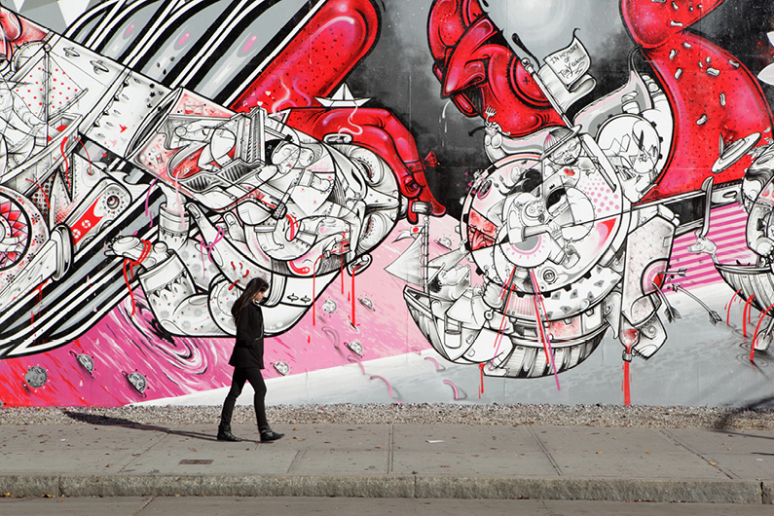In February 2019, street artists Curtis Kulig and DabsMyla (also known as Darren and Emmelene Mate) sued shoe company, Aldo, for copyright infringement. The retailer is alleged to have used their mural without authorization in promotional photos on Aldo’s social media. The suit is asking for damages, attorney’s expenses, and cessation of all use of their images in the future. This is one of several cases making its way through the courts asking is street art copyrighted.
Can street artists copyright their work?
Copyright covers many categories including literary works, musical works, and “pictorial, graphic, and sculptural works" from “which they can be perceived, reproduced, or otherwise communicated, either directly or with the aid of a machine or device.” However, copyright does not protect an idea, concept, process, or discovery.
“Copyright is the mechanism by which artists and creators can protect their work,” explains Jeff Gluck, Gluck Law Firm, P.C., who has represented many street artists in these cases including the Aldo suit noted above. He explains that once “an original work becomes fixed to a tangible medium of expression, the author has automatic copyright with a set of exclusive rights.”
However, Gluck notes that “If a work is found to lack the minimal amount of creativity and originality required to be considered 'copyrightable' then the author has no protection in that work.”
What is street art and graffiti?
While definitions of street art and graffiti vary, generally street art is the umbrella term that covers public art expression including stencils, murals, wheatpastes, and graffiti. Graffiti is sometimes seen as a style, but some consider it an illegal form of street art. However, other categories of street art are also illegal in different municipalities.
Many cities consider street art and/or graffiti as vandalism and have fines and even jail sentences for people convicted of the crime. For instance, in New York, graffiti that causes over $1,500 in property damage is a class D felony. Some cities require permits, such as Portland and Detroit, even if property owners grant artists permission to paint their walls or property owners may be fined.
When is copyright infringed upon?
A copyright is infringed upon when an entity—a person or organization—uses the copyrighted material without authorization of the owner beyond the limits of fair use. What constitutes fair use is an often disputed and grey area. When a company uses the work of a street artist for commercials or social media, that would be a violation of the artist’s copyright.
Does copyright cover street art or graffiti?
Yes, street art and graffiti are protected by copyright law since they are creative works that are “fixed to a tangible medium of expression” like a wall or an overpass, explains Brendan Healey, partner at Baron Harris Healey. Depending on the laws regarding graffiti and street art, someone may choose not to claim the work. However, Healey notes that “there is a tendency to devalue certain works of art because of what we typically think of as works of art. From copyright office perspective, it doesn’t really matter if it is a ‘work of art.’ It looks at whether it is creative or not.”
The legality of the artwork does not impact the copyright, Gluck notes. “Courts have consistently found that the legality of a work has no bearing on the 'copyrightability' of that work, especially in the context of street art.”
However, some companies have tried to use the illegality of the artwork as a defense in copyright cases. Gluck notes: “Some corporations are fighting against artists' rights and trying to destroy protections for street art and graffiti.”
Earlier this year, Mercedes sued four artists Daniel Bombardier, James "Dabls" Lewis, Jeff Soto and Maxx Gramajo because “the artists have threatened to sue for copyright infringement and are seeking a judge’s ruling asserting that the images do not constitute infringement.” Mercedes was claiming that they had a permit for the shoot and all the murals were on the outside of the buildings. Representing the artists, Gluck explains in an interview with Artsy that a ruling in Mercedes's favor will discourage artists from public murals in the future.
However, street artists should also take care not to infringe upon the works of others. Healey points out that pieces that are homages to other works and/or use another person’s work may be infringing on the rights of the original artist. He notes that people making a memorial to someone may have to deal with the post-mortem right of publicity, which varies by the state, that may protect the rights of the deceased, often celebrities, so their estates can continue profiting from their image.
What should street artists do to protect themselves?
Artists should consider registering their work with the U.S. Copyright Office, suggests Gluck. While works are still copyrighted without registration, “this provides them with an additional set of protections including the ability to seek statutory damages and recover their attorneys' fees, in context of infringement litigation,” he says. If an artist finds that their work has been infringed upon, they should consider consulting an attorney.
 By Elisa Shoenberger,
By Elisa Shoenberger, 

